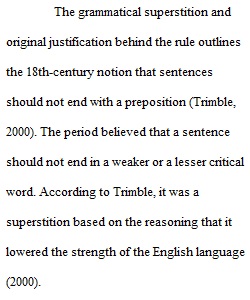


Q Welcome to Week 5. Now let's learn how to interact with specific passages from a text. "To my mind, a writer who never uses contractions is akin to someone whose outer seriousness has no inner humor under it. But the other side of the coin is equally true: a writer who constantly uses them is like someone whose outer humor has no inner seriousness under it" -- John Trimble (81). Week 5 Objectives: By the end of Week 5, you will: • Learn how to quote and paraphrase from a text, as well as how to incorporate those elements into a cohesive paragraph. • Learn what "superstitions" you may have been taught about writing that are, in certain circumstances, okay things to do. DUE WEDNESDAY MAY 6 BY 11:59 PM Readings/Viewings • Miya Tokumitsu "In the Name of Love" (Cohen 396-402) • Dave Zirin, "Pre-Game" (Cohen 424-423) • Trimble, "Quoting" (147-162) • Quoting & Paraphrasing Notes Actions • My Panopto video Stepping Into Quotations & Paraphrase (Links to an external site.) • This additional video on Paraphrase and Quoting: Assignments • Complete Week 5 Reading Response (25 points) Actions and submit it to the Week 5 Module. DUE SUNDAY MAY 10 BY 11:59 PM Readings/Viewings • Sample Body Paragraphs Actions • My Panopto video Sample Body Paragraphs Explained Part I (Links to an external site.) • Trimble, "Superstitions" (76-87) Assignments • Complete Trimble Writing Exercise #5 (25 points) Actions and submit it to the Week 5 Module. • Post to the Week 5 Discussion (25 points) Make one original post and reply to two classmates. Full instructions are posted in the discussion. Looking Ahead . . . Next week we'll continue our work with the Summary & Response essay by learning how to write the two response paragraphs and how to craft a thesis statement. Onward into Week 6... ENGL&101 – English Composition I (Online) Trimble Writing Exercise #5 Please use this form to complete the exercise and submit it to me using the dropbox in the Week 5 Module. This week's activity has one part. Part 1 After reading Trimble's section on grammatical superstitions, choose three and summarize (in your own words) both the original justification for the rule and Trimble's response for why the "rule" is a superstition.
View Related Questions